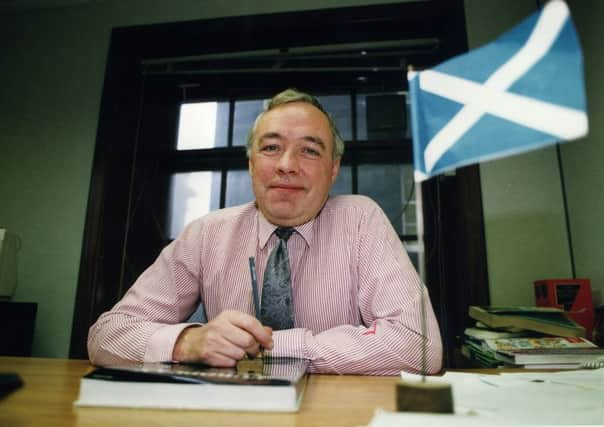Obituary: Grant Baird, independence-supporting economist who mentored Alex Salmond


Grant Baird was an ebullient economist and commentator who flew the flag for Scotland with enthusiasm and panache.
A lifelong SNP supporter, he started his career with the Bank of England but it wasn’t long before he was back north of the border, becoming chief economist with the Royal Bank of Scotland (RBS).
Advertisement
Hide AdAdvertisement
Hide AdFrom there he mentored protégés including former First Minister Alex Salmond, before going on to set up Brussels-based Scotland Europa, an organisation established as part of Scottish Enterprise to ensure Scotland’s voice and issues were heard by the European Union.
The son of an engine fitter, he was always known by his middle name and was apparently influential from a young age – after attending Arbroath’s Abbey Primary he became dux of the town’s high school and won a scholarship to St Andrews University, an event so impressive that his headmaster gave all the pupils a day off to celebrate.
That early success came despite the grief of losing his mother when he was still in primary school. A young man with a sharp mind and a huge intellect, he then gained a first in economics and economic history and moved to London in the mid 1960s to join the Bank of England as an economist in the chief cashier’s office.
He returned to Arbroath to marry his school sweetheart Glynne in 1966. His widowed father had already married Glynne’s widowed mother a few years earlier resulting in the unusual situation that meant the newlyweds were technically step-brother and sister.
Following the wedding the couple found their honeymoon curtailed due to a sterling crisis when the bank’s governors decided the groom was needed rather more at work than with his bride. The pound was devalued the following year.
Baird came back to Scotland in 1970 as chief economist at RBS. Widely respected both inside and outside the bank, he became something of the face and voice of the RBS, thanks to his role as a frequent commentator on economics on radio and television and in the press. He was also hugely revered by those he encouraged and coached.
He was made a visiting professor at Glasgow’s Strathclyde University in 1989 and then, after 21 years at the Royal Bank, he left the institution to set up Scotland Europa.
A confirmed Europhile, he became the organisation’s founding director and he and Glynne relished life in Brussels where, as a bon viveur and raconteur, he was perfectly suited to hosting the various business and social events his role entailed.
Advertisement
Hide AdAdvertisement
Hide AdHis wife was settled in the community there, as headmistress of an English-speaking school in Brussels, so when Baird was headhunted by Scottish Financial Enterprise (SFE) to return to Edinburgh they faced a dilemma over where to live. It was decided he would relocate to the Scottish capital, while she remained in Belgium in the job she loved and they would alternate weekends between the two capital cities.
Baird, who was elected a Fellow of the Royal Society of Edinburgh around this time, served as executive director of SFE for several years in the period leading up to Scottish devolution. He and Glynne had been fervent supporters of Scottish independence since their teens and, while living in Scotland, had been known to drive around their local area during election campaigns broadcasting to the populace through a loudspeaker fitted to the family car.
They remained committed to the cause with Glynne standing as a prospective SNP councillor at one point. When they both retired she returned to Edinburgh, although they continued to enjoy extensive travel to Europe and trips to their holiday cottage at Letham, near Arbroath.
An enthusiastic writer who regularly contributed to Scottish newspapers, including Scotland on Sunday, Baird was also passionate about history, in particular military history. He had visited many European battlefields and become something of an expert on the battle of Waterloo, nurturing an ambition to write its definitive history.
Sadly illness blighted the final years of life for both Baird and Glynne, who died in 2012. By then he had already suffered a series of strokes which left him with a degree of debilitation but he faced setbacks head on and continued to enjoy company, good conversation and a decent glass of wine.
He is survived by his sons Niall and Alasdair and their families.
alison shaw